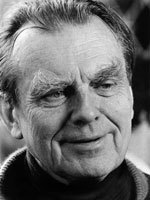 "The example of Czesław Miłosz inspires hope. He did that which is now imperative for people leaving the countries of Eastern Europe to do: he preserved his spiritual integrity and made his way back to the motherland."—Tomas Venclova, "Czesław Miłosz: Despair and Grace" (WLT Vol. 52, Summer 1978)
"The example of Czesław Miłosz inspires hope. He did that which is now imperative for people leaving the countries of Eastern Europe to do: he preserved his spiritual integrity and made his way back to the motherland."—Tomas Venclova, "Czesław Miłosz: Despair and Grace" (WLT Vol. 52, Summer 1978)
Czesław Miłosz (1911-2004) was a poet, writer, and translator who was born in present-day Lithuania. His first book of poetry was published in 1934. After World War II, where he spent his time in Warsaw, Miłosz defected to Paris in 1951, and the Communist government of Poland banned his works. He emigrated to the United States in 1960, where he began teaching at the University of California at Berkeley. It would not be until the Iron Curtain fell that Miłosz would be able to return to Poland, where he split his time between Poland and the United States until the time of his death.
"I have no hesitation whatsoever in stating that Czesław Miłosz is one of the greatest poets of our time, perhaps the greatest," said nominating author Joseph Brodsky. "Even if one strips his poems of the stylistic magnificence of his native Polish (which is what translation inevitably does) and reduces them to the naked subject matter, we still find ourselves confronting a severe and relentless mind of such intensity that the only parallel one is able to think of is that of the biblical characters," ("Presentation of Czesław Miłosz to the Jury," WLT Vol. 52, Summer 1978).
Among his very long list of works, the most well known are Zniewolony umysł (1953; tr. The Captive Mind), Zdobycie władzy (1955; tr. The Seizure of Power), The Witness of Poetry (1983), Nieobjęta ziemia (1984; tr. The Unattainable Earth, 1986), and Wiersze ostatnie (2006; "Last Poems").
In addition to his Neustadt Prize, Miłosz received the Nobel Prize in Literature in 1980. Additionally, 2011 was named "The Milosz Year," and many literatry festivals were organized around the world in honor of Miłosz's contributions to world literature.
1978 Neustadt Jurors and Finalists
NEUSTADT PRIZE 1978 |
||||
|---|---|---|---|---|
| JURORS | FINALISTS | |||
| Tuomas Anhava (Finland) | Anthony Powell (England) | |||
| Thorkild Bjørnvig (Denmark) | Nadezhda Mandelstam (USSR) | |||
| Joseph Brodsky (USSR/USA) | Czesław Miłosz (Poland) | |||
| Antônio Candido (Brazil) | Carlos Drummond de Andrade (Brazil) | |||
| Walter Helmut Fritz (West Germany) | Zbigniew Herbert (Poland) | |||
| Ágnes Gergely (Hungary) | János Pilinszky (Hungary) | |||
| Wolfgang Kraus (Austria) | Elias Canetti (Austria/England) | |||
| R. K. Narayan (India) | Graham Greene (England) | |||
| William Jay Smith (USA) | Eudora Welty (USA) | |||
| Derek Walcott (West Indies) | V. S. Naipaul (West Indies/England) | |||
| Andrée Chedid (Egypt/France) | Georges Schéhadé (Lebanon/France) | |||